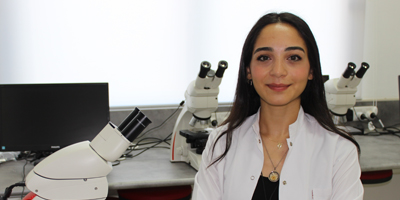COVID-19 and Food Safety

European University of Lefke (EUL) Vocational School of Health Services lecturer Assist. Prof. Dr. Yağmur Ekenoğlu Merdan conveyed detailed information about COVID-19 and Food Safety.
Merdan stated that Food Safety is defined by the United Nations Organization as taking the necessary rules and measures to eliminate the physical, chemical, biological and all kinds of hazardous risks that food may encounter during the production, processing, storage, transportation and distribution stages in order to ensure healthy food consumption. He stated that with the decision taken in December 2018, it is decided to celebrate 7 June as the World Food Safety Day every year since 2019.
In this context, Merdan stated that efforts to increase food safety throughout the world and biological, chemical and physical hazards of food origination are emphasized, and it is aimed to discuss the issues of identifying and preventing foodborne risks and ensuring food security.
Merdan suggested that, The World Health Organization reports that there are over 200 diseases that can also be fatal, resulting from unsafe food consumption. Foodborne diseases; They can be caused by bacteria, viruses, parasites, or chemical and physical factors, and they can cause illnesses starting from mild diarrhea to fatal poisoning and even cancer. An estimated 600 million people each year, according to WHO data, which is approximately one in every 10 people in the world is becomes ill due to insecure food and 420,000 people die from foodborne illness.
“One of the most frequently asked questions about the COVID-19 outbreak that affects the whole world was the question,” Is the SARS-CoV-2 virus transmitted by the food source? ” Many different explanations are made about how long the virüs stays alive on inanimate surface, constitutes the suspicion that the virus can be transmitted from food and food packaging.
Based on the available information, Merdan said there is no evidence of the passage of COVID-19 from food, and experiences from SARS and MERS created by coronaviruses show that people are not infected with coronavirus infections through food. Also, the World Health Organization has not yet reported that SARS-CoV-2 has been contaminated with food. She stated that SARS-CoV-2 is a respiratory tract disease, the main contamination is caused by close contact from person to person.. Merdan said, “An infected person’s cough, sneezing, speech, and the virus that spreads in the form of droplets are the most effective and basic way of contamination. We know that COVID-19 is unlikely to be transmitted by food or packaging, and there is no data to date that it has been transmitted by food or digestion. ”
“Coronaviruses need humans and animals as hosts to develop and multiply, that is, they cannot thrive on food and packaging, and cannot survive for a long time.” Stated by Merdan.
However, the coronaviruses can be transmitted through contact with the eye, nose, and mouth after contacting with the contaminated droplets that spread through the respiratory surfaces. ” She pointed out that touching the nose or eyes should be avoided after contacting food packages that are bought and hands should be washed with soap and water for at least 20 seconds.
Merdan stated that some rules should be followed while ensuring food safety practices when touching or preparing food;
- Care the hygiene in the kitchen. Clean the surfaces before and after use and disinfect them with suitable substances.
- Keep raw and cooked foods separate. Harmful microorganisms can easily reproduce in raw foods. You can prevent the passage of microorganism from raw food by keeping cooked foods that you make safe with heat separately. In order to avoid cross contamination, different utensils (such as plates, forks, knives) and chopping boards should be used for raw and cooked foods.
- Cook the food thoroughly. Take care to cook the food completely at the appropriate time and temperature. When reheating cooked dishes, make sure that they are fully heated.
- Store food at the correct temperature. Be careful not to leave your prepared dishes at room temperature for more than 2 hours. Foods to be served or stored cold should be kept in the refrigerator below 5 ° C, and foods to be served in the heat should be kept above 60 ° C. Thaw frozen foods in a microwave oven, soak them in cold water, or refrigerate them. Never dissolve by standing at room temperature or immersing in hot water.
- Use clean water and clean materials. Take care to wash the vegetables and fruits, which will be consumed raw, thoroughly with clean water.
“Even though no evidence has been shown for the passage of COVID-19 through food packaging until now, it is important to take some precautions considering that the packaging surfaces may be contaminated with the possibility of contamination. It is important to wash hands after returning home from shopping and using the newly purchased food packaging. Another way to minimize the risk of contamination of the food brought home is to keep it in a separate area with good ventilation. However, this recommendation will not be suitable for foods that need to be consumed or frozen immediately. Wash fresh products that will not be cooked before eating, under running water. For products that need to be frozen immediately or refrigerated; “It may be an appropriate measure to wash the surface of the packages with a small amount of soap and water, or to wipe them with a soapy cloth.”
Finally, Merdan said, even though there is no evidence that COVID-19 can be transmitted from food and packaging, let’s not forget that food surfaces or packaging may carry the virus. Therefore we can ensure we can not be contaminated from food packages or any other source unless we touch our face before washing our hands.
